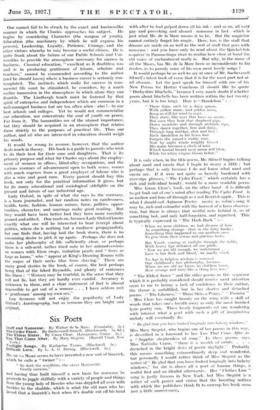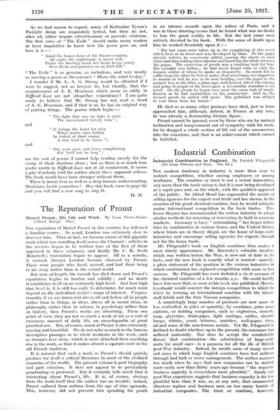Six Poets
MR. DE IAMARE seems to have invented anew sort of limerick, which he calls a "twiner " Bo doth the woodbine, the sweet Honisuckle Gently entwine,"
and having thus built himself a new basis for nonsense he
Proceeds to juggle skilfully with a variety of people and things NM the young lady of Beceles who was dappled all over with freckles to the shubble, which is what the old man who be- lieved that a limerick's -best when it's double cut off his head with after he had gulped down all his ink : and so on, all very gay and provoking and absurd—nonsense in fact-- which is just what .Mr. de la Mare means it to be. But the magician cannot entirely forget his magic. Here, too, is the stuff that dreams arc made-on as well as the sort of stuff that goes with nonsense : and you have only to read about the Quiekel-fish a-quiver in Parana-tinga river to realize how close at hand the old voice of enchantment really is. But why, in the name of all the Muses, has Mr. de la Mare been so inconsiderate to his readers as to parody some of his own most lovely songs ?
It would perhaps be as well to say at once of Mr. Sacheverell Sitwell's latest book of verse that it is for the most part not at all obscure. Let the poet speak for himself with one of his New Poems for Ilortus Conclusus (I should like to quote "Derbyshire Bluebells," because I very nmeh doubt if a better poem about bluebells has been written wit bin the last twenty years, but it is too long). here is " Dandelion " : -
These lions, each by a daisy queen, With yellow mane, and golden mien, Keep so still for wind to start.
They stare, like eyes that have no smart.
But once they hear that shepherd pipe, Down meadows and through orchards ripe, They dance together, lion and daisy,
Through long midday, slow and lazy :
Each dandelion in his fierce lust Forgets the sunset's • ruddy rust,
Now by night winds roughly kissed
His mane becomes a clock of mist Which mortal breath next moon will blow, While his white virgins bloom below."
It is only when, in the title-poem, Mr. Sitwell begins talking about nard and cassia that I begin to weary a little : but perhaps that is only because I do not know what nard and cassia are. If it were not quite so heavily burdened with over-ripe phrases, " The Cyder Feast," which certainly has a rich and individual beauty, would be a more readable poem.
Miss Gwen Clear's book, on the other hand - it is difficult to get fruit out of one's mind after reading T'hr Cyder Fees! - is as mellow and firm all through as a red Kentish apple. This is what I should call Autumn Poetry - merry as robin's song it may be, rich and colourful with the harvest of a keen observa- tion, but there is always that wistful note behind it, as of something lost, and only half-forgotten, and regretted. This is typically expressed in " The Hark-Buck " :- " When we were children, we had dreams of love As something strange—shut in the fairy books : Something that happened to our mothers once To give them their serene and gracious looks.
But Youth, coming at twilight through the fields, With heavy lips defeated all our pride. ' Now we aro old enough, we understand . . . Love is but flesh and blood,' we madly cried.
To Age in helpless wisdom is restored Our childhood's lost, philosophy, because, When we are okl we know, as children know, How strange and fairy-like a thing love was."
" The Eldest Sister " and the other poems in this sequenee which it is probably considered should receive most attention seem to me to betray a lack of confidence in their author, the theme is unfulfilled, but in her shorter and detached poems---" The Likeness," " Three Shies a Penny,' " Promise " — Miss Clear has caught beauty on the wing with a skill of words that takes one's breath away us only the most finished lyric poetry can. These lovely fragments set one wondering with interest. what a pact with such a gift of imaginative melody will eventually do.
" Be glad that you have looked longingly into bakery windows."
Miss Mary Siegrist, who begins one of her poems in this way, is described in a foreword to her You That Come After as a " Sapphic shepherdess of song." In these poems, says Miss Nathalia Crane, " there is a wealth of orbits .
drenched in the bright dews of poetic daylight.- Probably this means something extraordinarily deep and wonderful, but personally I would rather think of Miss Siegrist as the writer of " Be glad that you have looked longingly into bakery windows," for she is above all a poet of human things, a realist first and an idealist afterwards. Her " Clothes Line " song is justly famous in New York, but Miss Siegrist is a writer of such power and vision that the boosting notices with which the publishers think fit to enwrap her book seem just a little unnecessary.
• As we had reason to expect, many of Katharine Tynan's Twilight Songs are exquisitely lyrical, but they do not, after all, either require advertisement or provoke criticism. The first verse of " The Exile " should make many readers at least inquisitive to know how the poem goes on, and here it is :-
" Amid the honey-dews of the Sussex country, All night the nightingale is never still, Under the flooding moon her heart keeps sentry Over flocks and pastures on an Irish hill."
" The Exile " is as genuine, as melodious, and very nearly as moving a poem as Stevenson's " Blows the wind to-day.".
I wonder if Mr. L. A. G. Strong would be offended if I were to suggest, not as lawyers do, but timidly, that the reminiscences of A. E. Housman which occur so oddly in Difficult Lore arc not altogether coincidence ? I am quite ready to believe that Mr. Strong has not read a word of A. E. Housman, and if that is so; he hai an original way of putting things. The poems which begin :— " The fight that was no fight is over,
The uncontested victory won " :
and
" It wrings the heart for pity When lovers take forlorn In forfeit of their easing A new load to be borne ":
and
" Dry your eyes, and leave complaining
For 'twill not be long" :
are the sort of poems I cannot help reading merely for the swing of their rhythms alone ; but as there is so much true poetic worth in Difficult Love not at all reminiscent, it seems
a pity if nobody told the author about these apparent echoes. The book would have-been stronger without them.
There is music here as well as a deep human understanding.
Musicians, bestir yourselves ! Buy this book, turn to page 32, and you will find a new song to sing 0. H. M.















































 Previous page
Previous page